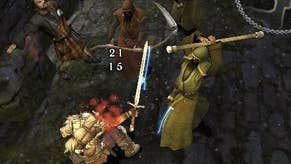The Bard's Tale
Strident strumming with stripping strumpets.
Order yours now from Simply Games.
For a genre that takes itself seriously to a fault, it's amazing that it's taken all this time for someone to poke fun at RPGs. In those bad old good old days when computers used to be steam powered [we really have come full circle -Ed] and required smacking like naughty children every now and then, Fergus McNeil and his Delta 4 gang were always taking the rise out of chin-stroking fantasy adventures, and for good reason. The comedy value in these mystical, dungeon-roaming, spell-casting epics is there for all to see. From the clichéd dim-witted yokel characters and hackneyed storylines of princesses stuck in towers to the faintly ridiculous game mechanics that see animals coughing up coins upon their death and the ritual destruction of barrels. RPGs may have gotten away with all manner of unselfconscious nonsense for the past quarter of a century, but no more.
And who better to point a mirror to the ridiculousness of our gaming conventions than one of the men who is largely responsible for perpetuating all this nonsense, Brian Fargo, head of The Bard's Tale developer inXile, responsible for the original classic mid-80s trilogy that - for many of us - got us into the genre in the first place. [as a side note, it was actually the 1988 Game Of The Year, Fallout-precursor Wasteland that really dragged me into full on RPG-dom, but that's another story]. The news of its return was simultaneously heartening, as well as being an unwelcome reminder that, yes, 20 years have passed since the genesis of the series.
Them were rotten days
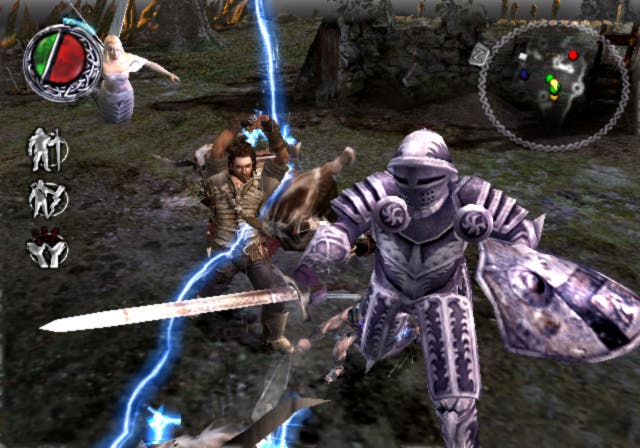
Back then though, the experience was a wonderfully simple case of dragging a merry band around a phenomenally basic (by today's standards) overhead map, engaging in progressively tougher (mostly random) battles (complete with crude animated close-up illustrations of your foes), gaining experience and loot, levelling up, finding, earning and buying new gear and so on until you eventually won through.
At the time it was in some senses revolutionary for providing a vast and persistent game world that was entirely at odds with most quick fix gaming available at the time. You could say that in essence not that much has changed about RPGs over the years other than the evolution of the graphics and audio, but in truth this remodelled Bard's Tale is less of a traditional RPG buffed up to date than a surprisingly basic slick hackandslasher with RPG elements added to help deliver a sense of progression.
With the game loosely based around the Orkney Islands, the setting has given inXile the chance to cut loose with its evident love for British and Irish caricatures (think BlackAdder, Python et al), so it's hardly surprising that the central protagonist is a relentlessly sarcastic cad rather than the sensitive troubadour he probably would have been in your regular, earnest retelling of the events of the Bard.
Beer. Here. Now.
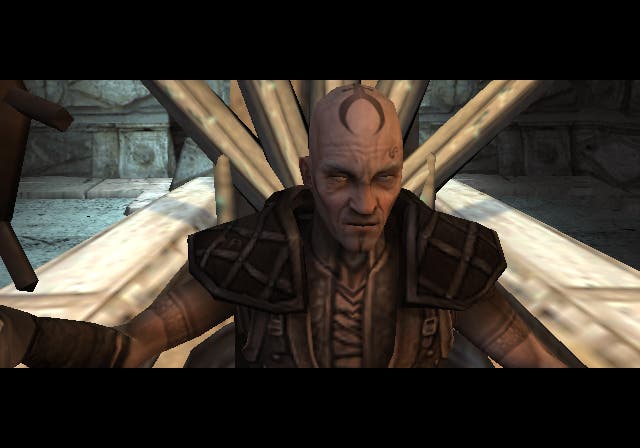
The lightened tone is immediately endearing, with the Bard's arrival at a local inn giving the wild-maned wandering minstrel the opportunity to demonstrate his machismo to a buxom wench while a posse of drunken losers sing heartily about 'beer, beer, beer, tiddily beer'. Wasting no time in dealing with rats-in-cellar/barrel-smashing clichés, you're soon off and running with a streamlined combat system and intuitive compass/objective pointer that leaves you in little doubt what you have to do and when.
The game's central innovation is to cram all of the game's commands into a slick interface that doubles up as a spell-casting system as well as a quick means of summoning the various members of your 'party'. Hit the right trigger and a menu slides onto the screen to bring up a bunch of basic attack categories, hit the relevant face button and hit it again to confirm which of the available 'songs' you want to play. An identical system is mapped to the left trigger, giving you a choice of various other useful commands.
Unlike most games of this ilk, the micromanagement is virtually nonexistent. This is either good news, if you can't be bothered to tinker around with your inventory and want to get on with the action, or bad news, if you're the sort of gamer who revels in kleptomaniacal joy. For example, if you manage to pick up an enhanced sword then the game simply cashes in your old one for you and automatically equips the new one, negating the need to tediously wander around with a ridiculously large arsenal that you must sell off piece by piece (or potentially drop because you've not got enough inventory spaces and all that jazz). In fact, the only time you ever need to tinker with anything is working out how to allocate your experience points when you level up, and that's a five-second job. As far as ease of use goes, The Bard's Tale gets most things spot on.
The joke's on you
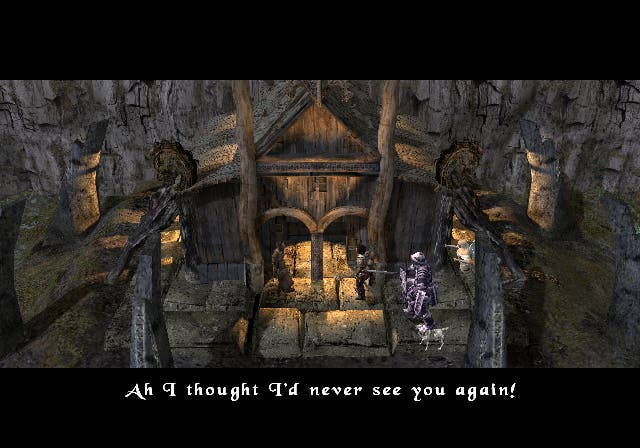
The cracks start to show, however, when you're busy fighting the hordes that the game throws at you every time there's an objective to resolve. For a game that happily spends much of its time laughing out loud at the stupid conventions of the RPG, to then force the player into a succession of contrived, repetitive and respawning combat scenarios is just daft. Initially these encounters consist of little more than one-button slash-fests, coupled with the incessant need to pick up your winnings, but even once you're blessed with a fully-fledged party of stragglers to call upon, some sections are so alarmingly repetitive and drawn out you start to wonder if this is actually an elaborate joke at your expense.
With the player fully responsible for movement and real-time combat (for this is no point-and-click turn-based cop-out), you'll spend literally hours stabbing the fire button, frantically running away when you need to heal, and hoping against hope that you can do enough to avoid being cornered and hacked to death in seconds. Whereas most games would perhaps allow you to drop into a pause menu to heal, The Bard's Tale elects to make this a maddeningly frustrating real-time affair that often gives you little time to pull off the three-button combo required to cast the appropriate spell. Worse still, all too often, the really tough battles end up climaxing miles away from a save point, meaning lots of unnecessary repetition if you're not vigilant enough to trudge back and checkpoint your progress before it all goes wrong at the very end of the chapter.
Such basic design irritations wouldn't perhaps be such a chore were the game's core combat not so underwhelming. We realise the two games could never be directly compared, but compare Devil May Cry's multi-tiered combat subtleties with The Bard's Tale and it's laughable. While RPG fans would probably spit their food across the room to entertain the comparison, it's hard to hide the fact that inXile's effort is little more than an experience-based hackandslash with RPG elements, which is quite clearly what Capcom's effort does very nicely indeed. inXile may have tried to streamline the more taxing elements of the RPG, but in turn has ended up producing something which is actually neither one thing nor the other, and will arguably rub up fans of either style of game the wrong way. Yes, The Bard's Tale gets its party management right, but aside from that it's just never as engaging an experience as you'd hope it to be from a team that really should know what it's doing.
I can't see for miles
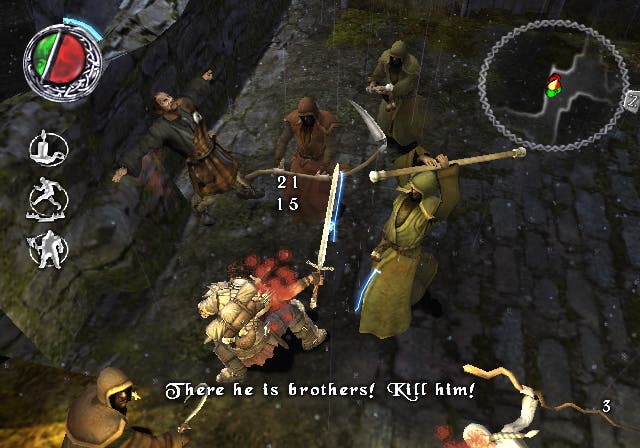
On a more positive note, the technical side of the game is pretty much faultless. Using the celebrated Snowblind engine (used in Champions Of Norrath among others), the isometric viewpoint gives a great vantage point for the action while never compromising on the level of detail it can chuck around. While it would have been nice for inXile to have increased the zoom in/out function to see what you're fighting on the screen at all times (as opposed to merely most of the time), the highly detailed texturing of the scenery and often excellent character models lend the game a high quality feel that never diminishes.
Probably the game's real saving grace, and the one thing that made us want to play on, was the consistently strong narrative that's full of chucklesome moments that seem a world away from the kind of dumb humour we feared. Sure, it hits as many bum notes as high ones, but at least they're trying. It's clear that the team has a definite knack for self-deprecating humour, and populates the world with endearingly idiotic characters, ridiculous songs from people who can't sing, and gives the Bard the kind of sneering sarcasm that the game needs to carry its almost constant stream of barbs. Some may find his relentless barrage tiresome (and sometimes it is a little caustic for the sake of it, rather than genuinely funny), but if you're in the right mood for it, it's a fitting reward for a succession of thankless tasks and constant to-ing and fro-ing. Without the Bard's barbs, some of the monotonous combat would be intolerably bland. As it is, we actually looked forward to seeing who we'd meet next as the game wore on, especially as we usually got to try out new gear and more powerful attacks in the process.
As you might have guessed by now, the audio work is definitely well up to scratch, with some fine characterisations that err just on the right side of clichéd (especially to our tired British ears that have to put up with all sorts of grating travesties in games, movies and TV shows), and a snappy script that does more than most in trying to be entertaining. Fair enough, it doesn't always hit the mark, but it can get away with a lot more random nonsense purely because it's taking the piss. Try the same thing in a po-faced tale of wizards, knights, orcs and mages and we'd probably be howling at the moon. As things stand here, they can camp it up almost as much as they like and pretty much get away with it.
Tale of woe
All told, The Bard's Tale had the right intentions. We fully appreciate where they were coming from, and admire a lot about what the game was trying to do. But while dumbing down the RPG premise for the casual console gamer might work for some people, it ultimately fell down for us by making the main action portion of the game really quite tiresome. Sure, the interface is great, the story and humour work pretty well, and it's well up to scratch technically, but if you turn out a game with boring battles then you've essentially soiled your own breeches. It'd be nice to imagine a sequel that rights all the wrongs of inXile's debut offering, but given the air of disinterest around this solid but unspectacular console RPG, we're dubious whether they'll be given the chance for atonement.
Order yours now from Simply Games.


